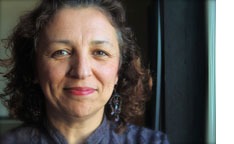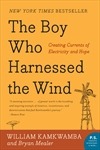Welcome to the April 2011 issue of the Global Washington newsletter. If you would like to contact us directly, please email us.
IN THIS ISSUE
- Note from our Executive Director
- Featured Story: New Staff member at Global Washington
- Featured Organization: Pre-vent: Healthcare for Women and Children Interview with Robin Jafari
- Changemaker: Young People and Development: Sammie Rayner, Founder and Executive Director at Lumana Credit
- Welcome New Members
- Book Review – The Boy Who Harnessed the Wind: Creating Currents of Electricity and Hope
- Announcements
- Global Washington Events
- Other Events
Note from our Executive Director
Greetings and happy spring to all of you,
We have been very busy at Global Washington. We have started the process of planning for our Annual Conference, which will again be hosted by Microsoft and will take place on their campus on October 31st and November 1st. We are also planning a statewide summit on international education for Nov 18th to be hosted by Seattle University. Our members are meeting and working to develop a strategy for both convenings. Let me know if you are interested in joining either of these groups.
I hope that you have had a chance to participate in some of our programming. We continue to bring to you thought leaders like David Roodman, Senior Fellow at the Center for Global Development, who will be here in early May to bring us the most recent dialogue about the microfinance industry. We are also looking forward to hearing from leaders like Dean Karlan, Professor of Economics at Yale University, whose research focuses on microeconomic issues relating to public policies and poverty.
We are proud of the caliber of the speakers we are bringing to Seattle to connect with our members. As we continue to do this work, we appreciate your involvement, support, and membership.
Thank you to all of you for the very important work you are doing around the world and I look forward to seeing you at our events,
In unity,
Bookda Gheisar, Executive Director
Featured Story
New Staff member at Global Washington
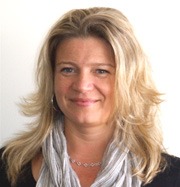 Greetings! I am so pleased to have recently joined the Global Washington team in order to increase our reach and visibility within the community and to deepen our connection to all of Global Washington’s members. With both current and new members I will be focused on hearing from you to ensure we are doing our best to strengthen, advocate, and educate on behalf of the international development sector in Washington State. Over the next couple of months I will be creating opportunities to meet you and your organization and to personally learn about your organization’s mission, current work, and plans for the future and how that connects with Global Washington and the larger development community.
Greetings! I am so pleased to have recently joined the Global Washington team in order to increase our reach and visibility within the community and to deepen our connection to all of Global Washington’s members. With both current and new members I will be focused on hearing from you to ensure we are doing our best to strengthen, advocate, and educate on behalf of the international development sector in Washington State. Over the next couple of months I will be creating opportunities to meet you and your organization and to personally learn about your organization’s mission, current work, and plans for the future and how that connects with Global Washington and the larger development community.
Please contact me at kate@globalwa.org if you have any questions, otherwise I look forward to meeting you soon!
Best Regards,
Kate Lorenzen
Featured Organization
Pre-vent: Healthcare for Women and Children Interview with Robin Jafari
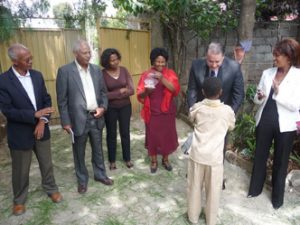 “Doing good comes from doing right,” says Dr. Robin Jafari. 2 years ago, Dr. Jafari and his wife Jodi, a neonatal nurse, founded Pre-vent, a nonprofit organization that helps women and children in need. Pre-vent promotes and supports maternal, newborn and child global health programs in developing countries through patient education, behavior change, workforce training and innovation. Pre-vent’s vision “is a world in which equitable and affordable access to preventive health education and services help protect vulnerable populations by focusing on sustainable innovations that have meaningful and measurable impact in lowering the incidence of maternal and child morbidity and mortality.”
“Doing good comes from doing right,” says Dr. Robin Jafari. 2 years ago, Dr. Jafari and his wife Jodi, a neonatal nurse, founded Pre-vent, a nonprofit organization that helps women and children in need. Pre-vent promotes and supports maternal, newborn and child global health programs in developing countries through patient education, behavior change, workforce training and innovation. Pre-vent’s vision “is a world in which equitable and affordable access to preventive health education and services help protect vulnerable populations by focusing on sustainable innovations that have meaningful and measurable impact in lowering the incidence of maternal and child morbidity and mortality.”
Dr. Jafari was inspired by the message that Ban Ki-Moon, current Secretary General of the United Nations, presented during his convocation speech at the University of Washington. He called for action and challenged everyone to do what they could to alleviate the challenges facing the global health community: “Don’t wait until you are asked to act, go ahead, be proactive and do some good. The sick and vulnerable people need you right now.”
“I believe that access to gender neutral healthcare is a fundamental human right of every woman and child and I strive to make this possible for as many people as I can. Bringing attention and funding for making sure that stillbirths are counted in vital health records has huge ramifications in the physical and emotional well being of mothers around the globe. At Pre-vent, we intend to make that happen,” Dr. Jafari explains.
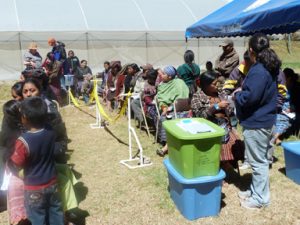 Pre-vent creates sustainable impact, reversing the trends in maternal and child illness and death through the implementation of programs that are inexpensive, sustainable and scalable in countries of greatest need such as Ethiopia, Uganda and Guatemala. In Uganda, Pre-vent Maternal Emergency Medication Kits containing life saving essential priority medications recommended by WHO will be distributed to community health centers in a program that save lives at birth with the cooperation of the Ministry of Health. These innovative kits that have unit dosing with easy instructions are used for post-partum hemorrhage, severe pre-eclampsia and eclampsia as well as maternal sepsis. Together, these three easily treatable conditions account for over 90% of maternal deaths, but regrettably most community health centers don’t have many of these readily available medications. Pre-vent is working on a similar Neonatal Emergency Medication Kit.
Pre-vent creates sustainable impact, reversing the trends in maternal and child illness and death through the implementation of programs that are inexpensive, sustainable and scalable in countries of greatest need such as Ethiopia, Uganda and Guatemala. In Uganda, Pre-vent Maternal Emergency Medication Kits containing life saving essential priority medications recommended by WHO will be distributed to community health centers in a program that save lives at birth with the cooperation of the Ministry of Health. These innovative kits that have unit dosing with easy instructions are used for post-partum hemorrhage, severe pre-eclampsia and eclampsia as well as maternal sepsis. Together, these three easily treatable conditions account for over 90% of maternal deaths, but regrettably most community health centers don’t have many of these readily available medications. Pre-vent is working on a similar Neonatal Emergency Medication Kit.
Pre-vent reaps many benefits by being located in Washington State such as the joyful philanthropic spirit that permeates here allows for opportunities for collaboration and partnerships with great institutions of giving, teaching, and research. “Not only is this part of the Pacific Northwest very beautiful, but Seattle is also becoming the global focus for maternal child health and charitable giving thanks to Melinda Gates. We are aware of the impact that Global Health can have on Washington State economic development; not only on technologic innovation, but also on human resource development and job creation,” Dr. Jafari explains.
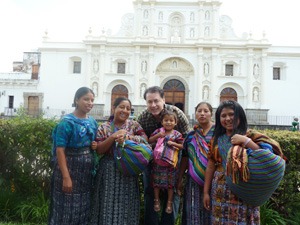 Pre-vent is interested in collaborating with other organizations in Washington State such as I-TECH, IHME, University of Washington’s Schools of Nursing, Global Health, and Ob/Gyn and Pediatrics, as well as with Seattle Children’s Hospital, and PATH.
Pre-vent is interested in collaborating with other organizations in Washington State such as I-TECH, IHME, University of Washington’s Schools of Nursing, Global Health, and Ob/Gyn and Pediatrics, as well as with Seattle Children’s Hospital, and PATH.
Creating and maintaining the sustainability of a non-profit does not happen without many challenges, but the rewards of helping your fellow human beings makes up for it.
“The first time I went to an HIV/AIDS care and treatment center in Ethiopia I was overwhelmed with emotion and could not control my tears as a result of seeing so many young, innocent, and beautiful children with HIV,” said Dr. Jafari. “The staff there told me that they frequently break down as well and cry in private. That was a strange experience for me because in my private practice I always kept my composure no matter what the situation was and was able to intervene directly.”
Dr. Jafari’s central message was one of encouragement because people can truly make a difference: compassionate and contagious philanthropy is the answer because “I am and I can. And so can you.”
Changemaker
Young People and Development: Sammie Rayner, Founder and Executive Director at Lumana Credit
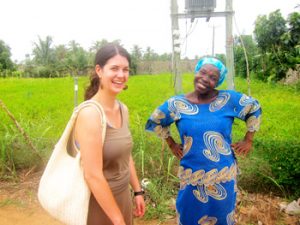 At the young age of 23, Sammie Rayner has already founded Lumana, a non-profit that is working to “alleviate poverty in rural communities through education and entrepreneurship.”
At the young age of 23, Sammie Rayner has already founded Lumana, a non-profit that is working to “alleviate poverty in rural communities through education and entrepreneurship.”
Rayner says she became interested in development through a “sudden turn of events” when she was enrolled in the University of Washington School of business. “I was in business school and realizing that I didn’t want a corporate career,” said Sammie. Then, in her junior year, Dr. Mohammed Yunus came to speak, and having read his book her interest in micro-finance grew.
This passion for development lead to a trip to Ghana. Sammie was with a group that had been working on some small-scale NGO projects. It was there that she worked with Chief Dr Samuel Adjorlolo, whom she mentions as one of her role models. When describing the Chief, Sammie reflects: “you see a lot of local chiefs that don’t invest as much in their community, so seeing him, his approach, and his ability to collaborate is incredible.”
Through this partnership, Sammie began a pilot project in the village in Ghana. Using only 5000 dollars, which she raised through a fundraiser, and in a time span of only two months, the program was able to serve 30 entrepreneurs. While running this pilot program, Sammie started working with a group of motivated young people on the concept of creating a microfinance institution to serve this community. This collaboration between young people in development and local level partnerships, ultimately led to the creation of Lumana.
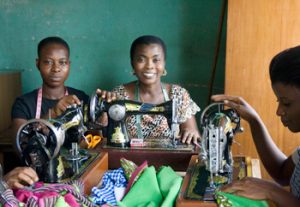 Although the organization has only been in existence since 2009, they have already given out loans to close to 250 borrowers in Ghana. While Lumana uses the group-lending model, there is a heavy emphasis on individual education. All borrowers must undergo upfront training, which teaches basic information about finances. “We don’t want anyone going through the program who doesn’t understand what an interest rate or debt is.” Additionally, once the loan has been given, financial literacy classes continue. “These classes mainly promote savings planning but also include marketing and business information,” said Sammie.
Although the organization has only been in existence since 2009, they have already given out loans to close to 250 borrowers in Ghana. While Lumana uses the group-lending model, there is a heavy emphasis on individual education. All borrowers must undergo upfront training, which teaches basic information about finances. “We don’t want anyone going through the program who doesn’t understand what an interest rate or debt is.” Additionally, once the loan has been given, financial literacy classes continue. “These classes mainly promote savings planning but also include marketing and business information,” said Sammie.
There are two primary criteria considered when someone applies for a loan with Lumana: “That you have a reasonable business goal, and you that they fit in the progress out of poverty index created by the Grameen Foundation.” This allows Lumana to ensure that they are serving clients that will help achieve their mission of poverty alleviation through entrepreneurship. Sammie cites these clients’ success as one of her biggest accomplishments. It is the everyday things like “hearing about Florence, who working towards purchasing her design machine and being almost three fourths of the way there.”
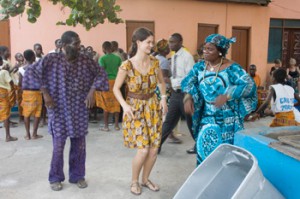 When asked if the global micro-finance crisis had negatively impacted Lumana, Sammie replied that it had not. In fact “we have not really been effected by the crisis, although it has made many donors and investors cautious about microfinance. After examining our organization and the many others around the world practicing safe microfinance, they are able to see how we are different and continue to support the organizations like ours who are client focused in our approach.” Because the borrower always comes first in the Lumana model, they are holding off expansion at least through this year. While they have looked into partnerships in Kenya, South Africa and Zambia, developing a concrete program before growth is important to the organization. “We really wanted to make sure we had a solid foundation and are not loosing the importance of what we are doing,” Sammie said. Some day the organization hopes to be financially independent, but has maintained a very clear position that they are putting the people first, so this may take some time. Already, Lumana is able to pay their three local staff in Ghana off of the profit their lending generates, so they are well on their way to financial sustainability.
When asked if the global micro-finance crisis had negatively impacted Lumana, Sammie replied that it had not. In fact “we have not really been effected by the crisis, although it has made many donors and investors cautious about microfinance. After examining our organization and the many others around the world practicing safe microfinance, they are able to see how we are different and continue to support the organizations like ours who are client focused in our approach.” Because the borrower always comes first in the Lumana model, they are holding off expansion at least through this year. While they have looked into partnerships in Kenya, South Africa and Zambia, developing a concrete program before growth is important to the organization. “We really wanted to make sure we had a solid foundation and are not loosing the importance of what we are doing,” Sammie said. Some day the organization hopes to be financially independent, but has maintained a very clear position that they are putting the people first, so this may take some time. Already, Lumana is able to pay their three local staff in Ghana off of the profit their lending generates, so they are well on their way to financial sustainability.
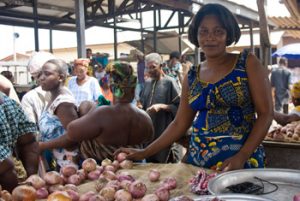 In addition to providing micro-finance Lumana also had a fellowship program to get young people involved in development. So far this fellowship has sent 21 young people from four countries to Ghana. This summer they plan to send four more and the fellowship program is evolving every year. The program includes language courses and the fellows have access to translators. The language is especially important as only 10% of the Lumana clients speak English, and there are thirteen local languages in Ghana. Sammie explained that this is actually why a lot of people choose to donate to Lumana, because of the youth involvement. The organization’s funding is 85% from individuals, so young people appear to be stimulating microfinance funding. Besides the fellowship program, Lumana is also partnering with Seattle University to give students more hands on experience. Currently, Lumana is helping to create curriculum for the global poverty class. During this class, Lumana will guest lecture, help to structure a project, and ultimately select a few students to go to Ghana.
In addition to providing micro-finance Lumana also had a fellowship program to get young people involved in development. So far this fellowship has sent 21 young people from four countries to Ghana. This summer they plan to send four more and the fellowship program is evolving every year. The program includes language courses and the fellows have access to translators. The language is especially important as only 10% of the Lumana clients speak English, and there are thirteen local languages in Ghana. Sammie explained that this is actually why a lot of people choose to donate to Lumana, because of the youth involvement. The organization’s funding is 85% from individuals, so young people appear to be stimulating microfinance funding. Besides the fellowship program, Lumana is also partnering with Seattle University to give students more hands on experience. Currently, Lumana is helping to create curriculum for the global poverty class. During this class, Lumana will guest lecture, help to structure a project, and ultimately select a few students to go to Ghana.
When asked what advice she would give to young people getting involved in development, Sammie said that she would recommend: “getting over the young person complex and recognizing that you can do something.” For her, this happened when she realized that she had the ability to raise $5000 and that money had the ability to really affect change for a community.
Sammie is the embodiment of inspiration and youth involvement in development. Not only has she created an innovative micro-finance organization that has served three villages in Ghana, she has also invigorated this interest in other young people. Mentorship is a role that Sammie will continue alongside her development goals. In her own words: “no matter what I am doing I think that I will constantly engage with young people.”
Welcome New Members
Global Washington would like to welcome its newest members! Please take some time to familiarize yourself with these organizations that are doing wonderful work in the state of Washington. Consider what opportunities there might be for collaboration and support. Together we are creating a unified voice for the development sector in the state and are working to build a equitable and prosperous world.
The YMCA of Greater Seattle is an inclusive organization of men, women and children with a shared commitment to nurture the potential of youth, promote healthy living and foster social responsibility. The Seattle Y supports strengthening the global community through: International youth and young adult exchange, service learning and cross-cultural education; Community Engagement of immigrant and newcomer populations; and Movement Strengthening by Increasing the capacity of Ys in developing countries to be self-sustaining.
The people of Montero, Bolivia and its environs know what they need. Our work is to facilitate and help communities find the pathways to sustainable and realistic answers to have those needs met. We’re a lean, practical organization whose donated dollars and energy go straight to improve health and support projects that provide clean water, nutritious food, education and income generation.
Global Helps Network exists to facilitate the adoption of villages among “developing countries” by churches and organizations in America. To assist the village leadership in their development socially, economically & spiritually, with a special emphasis on the “Untouchables (or Dalits) of India”.
West African Vocational Schools
West African Vocational Schools is a Christian, Seattle-based nonprofit that teaches job skills to people in Guinea-Bissau, one of the smallest and poorest countries in the world, empowering local leaders in Guinea-Bissau and giving them practical skills that translate into jobs. At its school in the city of Canchungo, more than 150 students take courses in sewing, computer basics, English and auto mechanics.
Schools for Salone is a non-profit organization committed to helping Sierra Leoneans rebuild the many rural schools destroyed during their country’s ten year long civil war that ended in 2002. The organization seeks to revitalize communities, empower children and ultimately improve socioeconomic conditions for families, communities, and future generations.
Clay for Earth serves as a symposium of sustainable solutions that have been proven practical, bringing together the brightest ideas developed through worldwide efforts. Many of the world’s most innovative ideas have taken years to develop. They offer practical solutions to poverty and community degradation. Many of these applications remain relatively unknown.
Individuals
- Joe Staiano
- Aze Malawo
Book Review
The Boy Who Harnessed the Wind: Creating Currents of Electricity and Hope
By William Kamkwamba and Bryan Mealer
Harper Collins Publishers, New York, NY, 2009
Imagine growing up in a world of magic where witches and wizards lay traps in the forest. Magic lions and hyenas wander villages at night. All pose special dangers to children. You play games with your two best friends, learn to hunt and build traps for animals. You attend primary school and your parents are able to support a large family with limited resources. As you get older, you start to take apart radios, figure out how they operate and fix them. You have dreams of being a scientist. Then the sudden death of an uncle results in the failure of a family business and your family’s economic circumstances rapidly decline. This tragedy is compounded by weather that destroys farm crops throughout the region. Plans of going to secondary school are derailed when your parents are unable to raise the $80 to pay school fees.
Welcome to the world of William Kamkwamba in a village in northern Malawi. This is his true story, as told by William with the assistance of Bryan Mealer (a former Associated press foreign correspondent) in The Boy Who Harnessed the Wind. It tells how, out of this disaster, a young teen following his intuition and inventiveness creates, with the help of cast off materials and a few library books about generating electricity, an amazing home made windmill. His neighbors think he is crazy but eventually view him as a local hero when his windmill provides electricity to his home and water to the village.
The heart-warming tale of persistence and eventual success is set within a severe famine in 2002. It provides a harrowing view of how poor peasant farm families can easily slide into profound destitution with no safety net or government support. And, it details how a family copes with dwindling food supplies as they go from 3 meals a day to one meal a day, then to fewer spoonfuls of food for each person at that one meal. The authors also outline the larger political and social forces that allow famines to occur and spread to impact thousands who starve and die.
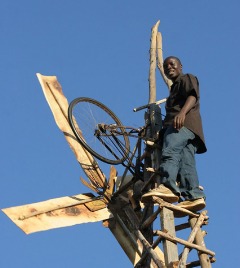 William’s ultimate success is a product of his own determination and confidence in himself. But, William doesn’t succeed in isolation, he succeeds because others see his determination and provide support. He is helped by friends around the globe who learn of his invention and who mentor him to further his education and communicate his story. Perhaps the greatest gift of this engaging book is the story of how we are all interconnected. Perhaps one of the most effective forms of “foreign aid” is for people with ideas and energy in wealthy countries to support people like William in poor countries who are working to solve their own problems and lift their families and friends out of poverty. And, most importantly to help young people like William realize their own dreams and develop into leaders within their countries. William sums these sentiments up eloquently at the end of the book when he writes:
William’s ultimate success is a product of his own determination and confidence in himself. But, William doesn’t succeed in isolation, he succeeds because others see his determination and provide support. He is helped by friends around the globe who learn of his invention and who mentor him to further his education and communicate his story. Perhaps the greatest gift of this engaging book is the story of how we are all interconnected. Perhaps one of the most effective forms of “foreign aid” is for people with ideas and energy in wealthy countries to support people like William in poor countries who are working to solve their own problems and lift their families and friends out of poverty. And, most importantly to help young people like William realize their own dreams and develop into leaders within their countries. William sums these sentiments up eloquently at the end of the book when he writes:
“We must encourage those still struggling to keep moving forward. My fellow students and I talk about creating a new kind of Africa, a place of leaders instead of victims, a home of innovation rather than charity. I hope this story finds its way to our brothers and sisters out there who are trying to elevate them selves and their communities, but who may feel discouraged by their poor situation. I want them to know they’re not alone. By working together, we can help remove this burden of bad luck from their backs, just as I did, and use it to build a better future.”
Read this inspiring short book, The Boy Who Harnessed the Wind, and attend a public book club and discussion on Thursday, May 12th, , 6:30 PM at the Life Enrichment Bookstore (LEMS) in Columbia City (5023 Rainier Ave S) The program is sponsored by the Seattle chapter of RESULTS (www.results.org, dedicated to creating the political will to end poverty and hunger) . For further information, contact Ellie Graham at elinoragraham@me.com.
Announcements
The University of Washington is hosting a discussion on the impact of global business
University of Washington’s Global Business Center, NetImpact, and the Global Business Association are presenting a panel discussion on “New Direction in Global Business: What does it take to make REAL change?” The discussion will take place on May 3rd at 6:00pm in Kane Hall 210 on the UW campus and will feature responsible business thought leaders discussing the new role of business in providing lasting positive impact on societies and the environment. The panelists will discuss what it takes to educate our future entrepreneurs, leaders and managers. Panelists include:
- Joyce Lavalle, former Sr. VP of Marketing, InterfaceFLOR
- Steve Lippman, Director, Environmental Engagement Strategy, Microsoft Citizenship
- Carol Sanford, author The Responsible Business
To register, please visit http://www.foster.washington.edu/news/pages/eventdetails.aspx?id=d6af0fdc-ff95-4040-9041-0ad92379dad9&startDate=20110503 or contact wrenmc@uw.edu for more information.
Author of Conversations with Power visiting Seattle
Brian Michael Till, author, columnist and Research Fellow at the New American Foundation, will be in Seattle discussing his new book Conversations with Power; What Great Presidents and Prime Ministers Can Teach Us about Leadership at a community event at St. Mark’s Cathedral on May 20th, at 7pm. The book is a compilation of Till’s conversations with world leaders whom he set out to interview as a new college graduate at the beginning his career. Conversations with Power includes insights from Bill Clinton, Jimmy Carter, Vaclav Havel, Mikhail Gorbachev, and others.
- Date: Friday, May 20, 2011
- Time: 7 P.M.
- Location: St. Mark’s Cathedral
- 1245 10th Ave. East
- Seattle, Washington 98102-4398
- 206-323-0300
Global Washington Focus Groups—Please join us!
We are planning to implement four Focus Groups in the beginning of May to discuss sectors of international development as an important first step to gather member input toward the process of developing Affinity Groups. We hope a focused and engaging conversation will lead us to potential objectives and expected outcomes for working together in more defined groups.
The four proposed Focus Groups will be regarding:
- Economic Development and Poverty Alleviation
- Environmental Sustainability: Climate, Water, Environment and Agriculture
- Global Health
- Small NOG’s Operational and Programmatic Needs
NOTE: Another sector of international development that many Global Washington members are active in is Education and Global Engagement. This sector has already been convening as the Global Education Affinity Group.
We recognize that most of your organizations have important work in a number of these sectors, but we are asking you to offer your expertise to only one for now to help contribute to a group discussion that will lead to actionable items for a working group later.
Let us know if you are interested! Please contact our new Membership and Program Coordinator, Kate Lorenzen at kate@globalwa.org or by phone at 206-547-9392 for proposed dates and times.
Human Rights Symposium “from Seattle to the World” taking place on May 2nd
The University of Washington is presenting “From Seattle to the World,” a symposium on human rights, featuring keynote Larry Cox, Executive Director of Amnesty International. Other presenters include James Bible, President of NAACP of Seattle & King County; Pramila Jayapal, Founder/Executive director of OneAmerica; and Magdaleno Rose-Avila, Globa Justice Leader and Activist.
The Symposium will take place at the University of Washington in Kane Hall Room 220 on May 2nd from 6:00-7:30 and will be followed by a reception celebration.
Committee For Children Is Hiring In Seattle
Committee for Children is a dynamic nonprofit recognized internationally as a leader in developing research-based violence prevention and social and emotional educational curricula. CFC is currently looking for an International Partnership Manager, a Fund Development and Advocacy Strategist, and a Design Intern. For more information or to apply, please visit: http://www.cfchildren.org/about/jobs/
Zambian Ambassador Visits Seattle
At 4:00pm on the 28th, Global Washington is hosting a roundtable discussion with Zambian Deputy Ambassador Mr. Alfred Chioza accompanied by Mr. Willie Ndembela (Economic) Counsellor. The discussion will be followed by special music from Maisha Soul, a musical group from the DR Congo. For more information or to register, visit the Global Washington website. Ambassador Sheila Siwela was originally scheduled to conduct this discussion and sends her apologies that she can no longer attend.
Global Partnerships Receives Significant Investment From FMO
The Netherlands Development Finance Company (FMO) recently announced an investment of $4.4 billion in Global Partnership’s Social Investment Fund, a fund which loans capital to microfinance institutions in Latin America. GP’s fund targets organizations that reach those that most need credit, particularly the rural poor. Most of these organizations provide other services beyond loans, making the work more impactful. We congratulate Global Partnership and FMO on this important collaboration, which will help provide quality financial services to underserved populations.
For more information, please visit: http://www.globalpartnerships.org/sections/newsinfo/newsinfo_nr_GP_fmo_investment.htm
The Global Helps Network Hosts Sister Church Seminar
The Global Helps Network is hosting a seminar for local church leaders and other interested parties to learn more about working for and among the poorest of the poor in India. The seminar will present particular opportunities for service for the Western church. Each partnership is unique and may include the teaching and training of leadership teams of the fledgling congregations, not only in Biblical topics like preaching, and running a church, but practical topics as well, like economic development skills, financial management, village healthcare and advocacy issues. For more information or to register, please visit: http://www.globalhelpsnetwork.org/Seminars.html
Seattle University and Esperanza International Present Perspectives on Global Citizenship Conference
Perspectives on Global Citizenship: Cultivating Transformative Change through Cross Cultural Service
take place on May 7th, from 9:00 to 5:30 at Seattle University. Conference objectives include:
- Develop leadership skills
- Learn best practices from leaders in the service-learning field
- Focus on building partnerships with host communities
- Create quality service programs
- Promote long-term commitment to solidarity, public service and global engagement
The costs is $15 per participant and $10 for students. Visit www.esperanzaint.org/service-conference for session descriptions or to register.
CityClub Annual Meeting to feature a discussion about regional governance
CityClub’s annual meeting on May 4th is titled “A Regional Governance Conversation” and will feature Phillip Chicola, Consul General of the United States of America in Vancouver and Denis Stevens, Consul General of Canada in Seattle. The discussion will be moderated by Steve Scher of KUOW 94.9 FM.
The meeting will take place at the Washington Athletic Club (1325 6th Avenue, Seattle). Registration starts at 11:30am and the lunch of program are from 12:15 to 1:30pm.
Visit www.SeattleCityClub.org to register or call 206-682-7395.
RESULTS hosts public book club and panel on The Boy Who Harnessed the Wind
On May 12th from 6:30-8:30pm at Life Enrichment Bookstore, RESULTS Seattle is hosting a panel discussion on The Boy Who Harnessed the Wind by William Kamkwamba and Byran Mealer. The book is the story of a 14-year-old boy living in rural Malawi. For more details about this book, please see our the “Book Review” section of this newsletter.
When: May 12, 6:30-8:30pm
Where: Life Enrichment Bookstore, Columbia city
5023 Rainier Avenue South
Seattle, WA 98118
Contact: Ellie Graham (elinoragraham@me.com or 206-721-0141) for more information
Global Washington Events:
Thursday, April 28
Roundtable with Zambian Ambassador from Washington D.C. with special music from Maisha Soul
Friday, May 6
Myths of Technology for International Development
Global Washington Member Social
Monday, May 9
The Global Implications of India’s Microcredit Crisis
Monday, May 16
Evaluation Workshop with Innovations for Poverty Action
More Than Good Intentions: Book Discussion
Tuesday, May 17
Evaluation Workshop with Innovations for Poverty Action
Other Events:
Wednesday, April 27
“Future Role for the U.S. in Meeting Global Challenges”
Thursday, April 28
Business and Investment Opportunities in Africa
Exploring Humanitarian Law Workshop for Educators
Tuesday, May 3
New Directions in Global Business: What does it take to make REAL change?
Wednesday, May 4
Cityclub Annual Meeting: A Regional Governance Conversation – Washington & British Columbia
Thursday, May 5
World Affairs Council Spokane: Humanitarian Aid: A Practitioner’s Perspective
Saturday, May 7
Perspectives on Global Citizenship: Cultivating Transformative Change through Cross Cultural Service
Wednesday, May 11
Liberia Peacebuilder Initiative (LPI) Launch Event!
Friday, May 13
Be the Spark: Keynote Address – Desmond Tutu, Nobel Peace Prize Laureate
Monday, May 16
Songea’s Kids: Hope Village Night
Friday, May 20
Sister Church Partnership…The Seminar
“Conversations With Power” Community book event
Thursday, June 2
Trade Development Alliance: 20th Anniversary Dinner
Friday, June 10
The Vietnamese Friendship Association Third Annual Benefit Dinner “Planting Roots, Shaping Futures”
Monday, June 13
Woodland Park Zoo – Travel for Teachers in Summer 2011 – Borneo, Primate Conservation
